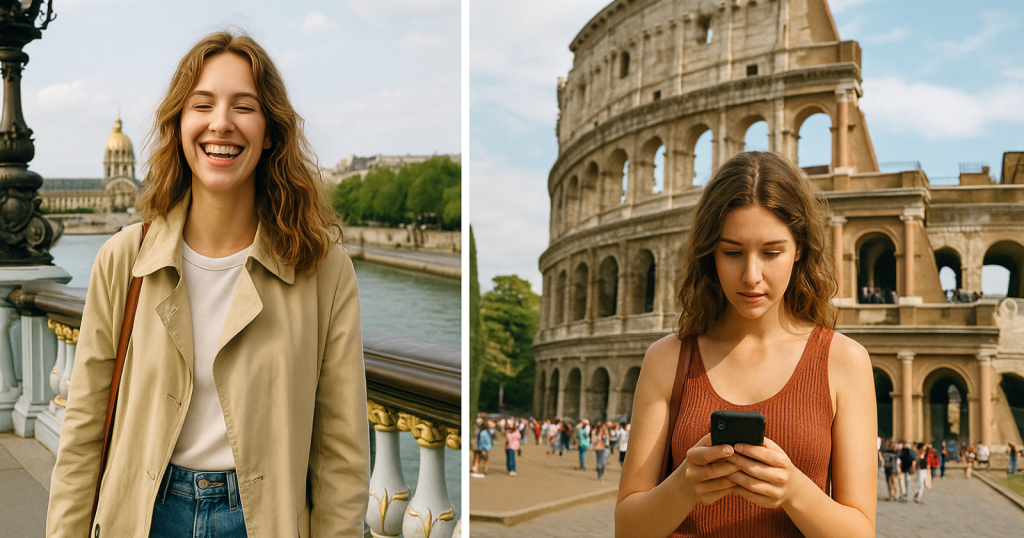menu
Follow Us
Subscribe
Three weeks across France and Italy convinced me some classic travel wisdom backfires—these are the rules I’m happily breaking now.
Maya Flores / Aug 30, 2025
Three weeks across France and Italy convinced me some classic travel wisdom backfires—these are the rules I’m happily breaking now.
I landed in Paris with a carry-on, a notebook, and every “definitive” thread I’d saved about France and Italy.
The rules clanked in my head like pots on a busy line: never eat near major sights, avoid places with photo menus, never order cappuccino after 11, don’t sit if there’s a coperto, skip dessert because bakeries are better, and my favorite tyrant — maximize your days.
Three weeks later, I came home with a softer rulebook and a stack of little rebellions I plan to repeat.
One of my best lunches happened two streets off the Seine, within earshot of a busker’s accordion that would make a cynic weep.
It was supposed to be a trap: chalkboard script too pretty, tourist-heavy tables.
But the kitchen sent out a lentil salad that tasted like it had been dressed by a grandmother with exacting hands — mustard hot, vinegar bright, shallots sharp enough to make you sit up straight.
Sometimes the view and the food share a soul. Snobbery starves you faster than any tourist menu.
In Marseille, a little spot by the port had a laminated page of sun-faded images that screamed “no.”
The fish soup they served me whispered “yes” in a dozen dialects: saffron, fennel, ocean. The owner pointed to the photo and then to my bowl with a proud shrug, as if to say, “It may be ugly, but it’s ours.”
Food photos are not a sin — indifference is.
I’d rather eat humble pride than concept-restaurant cynicism any day.
Some mornings I stood like a proper commuter and knocked back an espresso in two gulps, a miniature lightning bolt. Other mornings I paid the heresy fee to sit at a terrace and practice stillness with my cup.
The extra euros bought me time—watching a fruit vendor stack apricots into a color theory lesson, eavesdropping on a debate about butter versus olive oil, noticing the way the city exhales at 9 a.m.
Time is the ingredient travel cooks too quickly. Pay for it when you can.
In Bologna, at 3:17 in the afternoon, my feet gave up their rights.
I ordered a cappuccino like a reckless tourist, braced for judgment, and got a perfect cup and a nod from the barista who had clearly seen worse transgressions than foam after lunch.
Customs are chorus lines, not handcuffs.
Learn them, respect them, then listen for when your body asks for a solo.
Florence taught me that sometimes the dessert after a meal isn’t competing with the gelateria; it’s closing a conversation. A honeyed panna cotta in a tiny trattoria tasted like a well-landed sentence.
If I’d skipped it out of dogma, I would’ve missed the owner’s proud story about the beekeeper who brings jars at dawn.
Rules written far from the table can’t know what the table is trying to say.
In Paris, I returned to the same boulangerie three mornings in a row.
The first croissant was flaky and anonymous. The second came with a smile and a recommendation for the apple chausson that eats like a love letter. The third came with a joke about my accent and an extra heel of warm baguette “for the road.”
Novelty is a spark, but repetition is how you build a fire.
My itinerary looked ambitious on paper: Paris to Lyon to Marseille, then across the border to Genoa, Florence, and Rome.
The best day?
Lucca, a place I almost skipped. I rented a three-speed bike that rattled like cutlery in a drawer and rode the city walls in slow circles under plane trees.
Lunch was bread, tomatoes, and a local olive oil that rained pepper down the back of my throat. Zero bucket-list points, maximum nourishment.
Fewer moves, deeper flavors.
Locals are not a monolith; they’re a map with a thousand tiny streets.
In Rome, a place with a mix of tourists and neighborhood regulars fed me a carbonara that was glossy with egg and guanciale—no cream, no apology.
The table beside me was a family birthday. The table behind me was a couple from Madrid; my table was mine, not a referendum.
I chase kitchens full of care, not dining rooms full of qualifiers.
Specials can be traps, yes, but they can also be the cook’s sudden crush on a seasonal thing.
In Nice, the special was raw zucchini ribbons tossed with shaved sheep’s cheese, lemon, and mint. It tasted like a breeze snuck into the kitchen and seasoned the bowl. The server explained they’d received a glut of small, sweet zucchinis that morning.
Specials are the kitchen talking in the present tense. I want to hear it.
I carried some cash like a responsible aunt and used my card freely where it was welcomed.
The dance is simple: ask with your eyes, follow the hint, have a backup.
Anxiety consumed more time than any ATM line. Also: if a place is “cash only” but the food is honest and the service kind, I’m not going to write a manifesto in the street about it.
I love an early line as much as the next overachiever, but one afternoon in the Musée d’Orsay, I arrived late by accident and found softer crowds and gentler light.
My shoulders dropped somewhere between Degas and the clock window. Art doesn’t punish you for arriving on human time. The point is to be reached, not scored.
Some of my favorite meals were train picnics: a wedge of cheese with a rind that tasted faintly of cellar, cherries bruising the page of my notebook, bread so fresh it squeaked, a knife I probably shouldn’t have packed, and a view of sunflower fields doing their loud yellow song.
Restaurants are choreography; picnics are improv.
Every trip needs both.
I rented an apartment for four nights and cooked exactly twice, which felt like therapy.
In Lyon, I bought baby artichokes, a lemon, and a reckless amount of butter.
I blanched, sautéed, and made a pan sauce that would pass a French grandmother’s eyebrow test. Cooking in a place answers the landscape back. The ingredients travel through you instead of only to you.
I spoke clumsy French and clumsier Italian, and most people met me more than halfway.
Language is a bridge that loves effort.
The best compliment I got was a patient correction from a grocer in Florence, followed by a plum she tucked into my bag like we were co-conspirators.
Shame feeds silence. Curiosity feeds connection.
I had a constellation of “musts,” and I visited many, and they were beautiful.
But the moments that sat me down and made me breathe were smaller: a butcher in Genoa who insisted I taste pesto the way his mother did (on a potato slice), a waitress in
Marseille who taught me to pronounce bouillabaisse with the right kind of throat, a Roman nonna who shook her head at my attempt to twirl spaghetti and then demonstrated the wrist like passing down a spell.
The list told me where to stand; the people told me how to be.
I don’t rewrite menus, but I do ask questions.
“Could you make that without anchovy?” earned me a smile and a note in the kitchen; “could you do it dairy-free?” once got me something even better that wasn’t listed.
Chefs are not vending machines; they’re composers. If you ask like a collaborator, you might hear a new song.
Three weeks turned out to be the opposite of running away — it was returning to senses I’d dropped in the rush of routine.
I reclaimed my appetite for slow mornings, for bread torn with hands, for watching light climb a wall like a careful cat.
I came back with fewer rules and a stronger pulse for the ones that matter: be kind to the human serving you; say thank you in their language; choose patience when you can; choose joy when you can’t.
Carry a scarf, drink water, and leave room — on plates, in days, in the suitcase.
The advice I’ll ignore next time is anything that confuses performance with presence.
I don’t need to win France or Italy. I just want to taste them, and taste them again, and let the tasting change me.
Maya Flores is a culinary writer and chef shaped by her family’s multigenerational taquería heritage. She crafts stories that capture the sensory experiences of cooking, exploring food through the lens of tradition and community. When she’s not cooking or writing, Maya loves pottery, hosting dinner gatherings, and exploring local food markets.
Aug 31, 2025
Aug 31, 2025
Aug 31, 2025
Aug 31, 2025
Aug 31, 2025
Aug 31, 2025
Aug 31, 2025
Aug 31, 2025
Aug 31, 2025
Aug 30, 2025
Aug 30, 2025
Aug 30, 2025
A Brown Brothers Media Company © 2025 All Rights Reserved.




